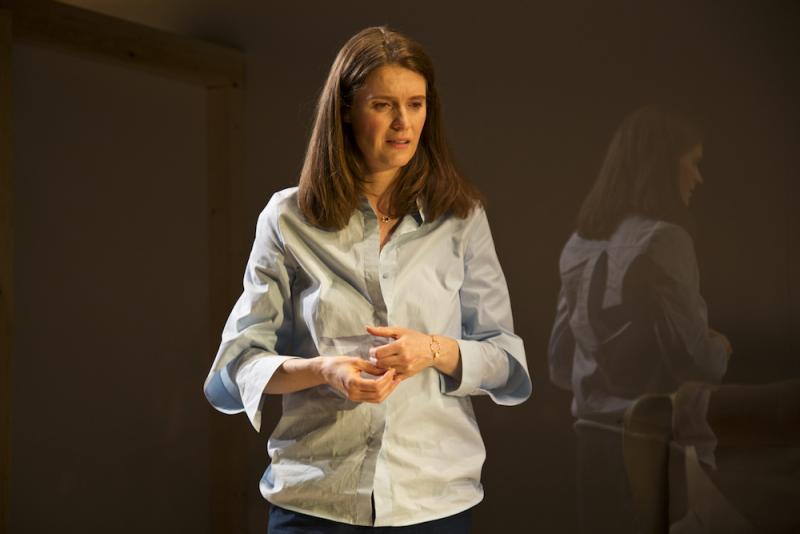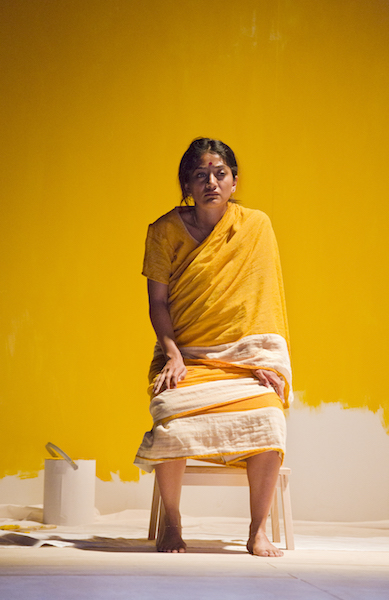Bodies, Royal Court review – pregnant with meaning | reviews, news & interviews
Bodies, Royal Court review – pregnant with meaning
Bodies, Royal Court review – pregnant with meaning
New drama about surrogacy is rich in metaphor and fraught with conflict

Surrogacy is an emotionally fraught subject. The arrangement by which one woman gives birth to another’s baby challenges traditional notions of motherhood, and pitches the anguish of the woman who can’t have children herself against the agony of another woman who gives up her child.
Although Clem and Josh occupy a highly privileged social position, which allows them to spend some £22,000 to pay Lakshmi to carry their child, they are not without their own misfortunes. For a start, the baby has no genetic connection to Clem, its new mother, and she has other problems in the shape of her father, David, an old socialist in his 70s who is suffering from motor neurone disease. His new carer, Oni, is soon closer to him than his own daughter and conflicts between them arise when he makes a political criticism of Clem’s use of money to buy herself a child.
Their exchanges are lightly humorous and thoroughly middle-class
But the most daring gesture of a play that brims with powerful emotions and interesting ideas is Franzmann’s decision to create fantasy sequences in which Clem talks to the perfect daughter that she imagines she will soon have. Sourcing the egg from Russia means that the couple have chosen a tall blonde girl with no genetic connection to the woman who has carried her for nine months. In fact, only gradually is Lakshmi’s situation (pictured below), her lack of legal rights and her terrible pain, revealed. As usual, this kind of financial transaction seems to be dehumanising, in a very human way, to everybody concerned. There are no winners.
Except perhaps the fantasy figure of Clem’s daughter, whose physical perfection is shown at the age of 16 and whose intelligence and charm are a compelling projection of her mother’s dreams and wishes. Their exchanges, one of which begins the play with a discussion about kale crisps, are lightly humorous and thoroughly middle-class. But even these develop rapidly into inevitable conflict: as Clem rightly perceives, how and when do you explain to a surrogate’s child exactly where they come from (genetically) and how does that affect them (emotionally)? What will they think of the woman they call mum, and of the woman who bore them?
 But although Franzmann vividly portrays the desperation and distress of Clem’s nine years of trying for a child, as well as Josh’s desire to be a father (and David’s firm disapproval of the whole process), there is something very conservative in her picture of Clem’s feelings. After all, there are plenty of women who do not define themselves by their ability to conceive children, and who don’t go to pieces every time they see another woman’s babies. Likewise, the story covers very similar ground to that of Satinder Chohan’s equally compelling play, Made in India.
But although Franzmann vividly portrays the desperation and distress of Clem’s nine years of trying for a child, as well as Josh’s desire to be a father (and David’s firm disapproval of the whole process), there is something very conservative in her picture of Clem’s feelings. After all, there are plenty of women who do not define themselves by their ability to conceive children, and who don’t go to pieces every time they see another woman’s babies. Likewise, the story covers very similar ground to that of Satinder Chohan’s equally compelling play, Made in India.
Still, Jude Christian’s production radiates empathy and explores all the angles of this surrogacy. David’s love of aviary birds, and Clem’s job as a producer of medical documentaries, provides a series of powerful metaphors, and these are conveyed economically and strongly. Designer Gabriella Slade’s muted beige and pine set suggests all the comforts of upper-middle-class domesticity, and the cast is uniformly excellent. Justine Mitchell’s Clem travels from amusing day-dreaming to confrontation with the realities of neo-colonial exploitation. On press night, Jonathan McGuinness gamely took the role of Josh at short notice due to another actor’s illness. He is great, and so are Philip Goldacre (David), Lorna Brown (Oni), Salma Hoque (Lakshmi) and Hannah Rae (Daughter). Bodies is a treat for mind and emotions alike.
rating
Explore topics
Share this article
The future of Arts Journalism
You can stop theartsdesk.com closing!
We urgently need financing to survive. Our fundraising drive has thus far raised £49,000 but we need to reach £100,000 or we will be forced to close. Please contribute here: https://gofund.me/c3f6033d
And if you can forward this information to anyone who might assist, we’d be grateful.

Subscribe to theartsdesk.com
Thank you for continuing to read our work on theartsdesk.com. For unlimited access to every article in its entirety, including our archive of more than 15,000 pieces, we're asking for £5 per month or £40 per year. We feel it's a very good deal, and hope you do too.
To take a subscription now simply click here.
And if you're looking for that extra gift for a friend or family member, why not treat them to a theartsdesk.com gift subscription?
more Theatre
 Macbeth, RSC, Stratford review - Glaswegian gangs and ghoulies prove gripping
Sam Heughan's Macbeth cannot quite find a home in a mobster pub
Macbeth, RSC, Stratford review - Glaswegian gangs and ghoulies prove gripping
Sam Heughan's Macbeth cannot quite find a home in a mobster pub
 The Line of Beauty, Almeida Theatre review - the 80s revisited in theatrically ravishing form
Alan Hollinghurst novel is cunningly filleted, very finely acted
The Line of Beauty, Almeida Theatre review - the 80s revisited in theatrically ravishing form
Alan Hollinghurst novel is cunningly filleted, very finely acted
 Wendy & Peter Pan, Barbican Theatre review - mixed bag of panto and comic play, turned up to 11
The RSC adaptation is aimed at children, though all will thrill to its spectacle
Wendy & Peter Pan, Barbican Theatre review - mixed bag of panto and comic play, turned up to 11
The RSC adaptation is aimed at children, though all will thrill to its spectacle
 Hedda, Orange Tree Theatre review - a monument reimagined, perhaps even improved
Scandinavian masterpiece transplanted into a London reeling from the ravages of war
Hedda, Orange Tree Theatre review - a monument reimagined, perhaps even improved
Scandinavian masterpiece transplanted into a London reeling from the ravages of war
 The Assembled Parties, Hampstead review - a rarity, a well-made play delivered straight
Witty but poignant tribute to the strength of family ties as all around disintegrates
The Assembled Parties, Hampstead review - a rarity, a well-made play delivered straight
Witty but poignant tribute to the strength of family ties as all around disintegrates
 Mary Page Marlowe, Old Vic review - a starry portrait of a splintered life
Tracy Letts's Off Broadway play makes a shimmeringly powerful London debut
Mary Page Marlowe, Old Vic review - a starry portrait of a splintered life
Tracy Letts's Off Broadway play makes a shimmeringly powerful London debut
 Little Brother, Soho Theatre review - light, bright but emotionally true
This Verity Bargate Award-winning dramedy is entertaining as well as thought provoking
Little Brother, Soho Theatre review - light, bright but emotionally true
This Verity Bargate Award-winning dramedy is entertaining as well as thought provoking
 The Unbelievers, Royal Court Theatre - grimly compelling, powerfully performed
Nick Payne's new play is amongst his best
The Unbelievers, Royal Court Theatre - grimly compelling, powerfully performed
Nick Payne's new play is amongst his best
 The Maids, Donmar Warehouse review - vibrant cast lost in a spectacular-looking fever dream
Kip Williams revises Genet, with little gained in the update except eye-popping visuals
The Maids, Donmar Warehouse review - vibrant cast lost in a spectacular-looking fever dream
Kip Williams revises Genet, with little gained in the update except eye-popping visuals
 Ragdoll, Jermyn Street Theatre review - compelling and emotionally truthful
Katherine Moar returns with a Patty Hearst-inspired follow up to her debut hit 'Farm Hall'
Ragdoll, Jermyn Street Theatre review - compelling and emotionally truthful
Katherine Moar returns with a Patty Hearst-inspired follow up to her debut hit 'Farm Hall'
 Troilus and Cressida, Globe Theatre review - a 'problem play' with added problems
Raucous and carnivalesque, but also ugly and incomprehensible
Troilus and Cressida, Globe Theatre review - a 'problem play' with added problems
Raucous and carnivalesque, but also ugly and incomprehensible
 Clarkston, Trafalgar Theatre review - two lads on a road to nowhere
Netflix star, Joe Locke, is the selling point of a production that needs one
Clarkston, Trafalgar Theatre review - two lads on a road to nowhere
Netflix star, Joe Locke, is the selling point of a production that needs one

Add comment